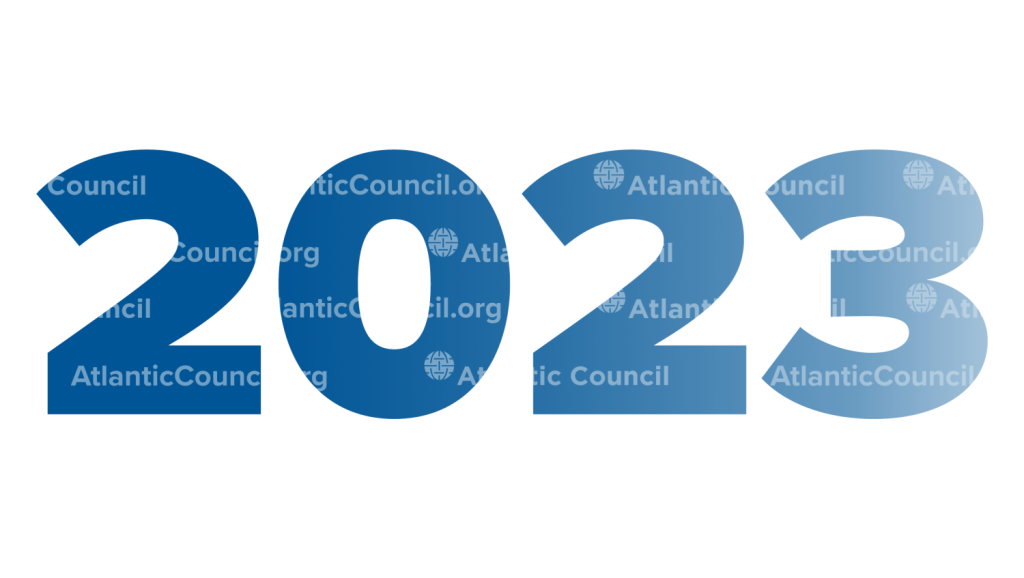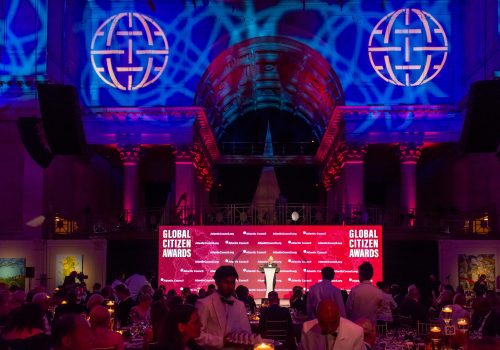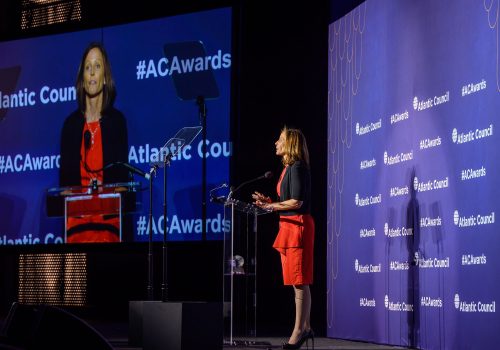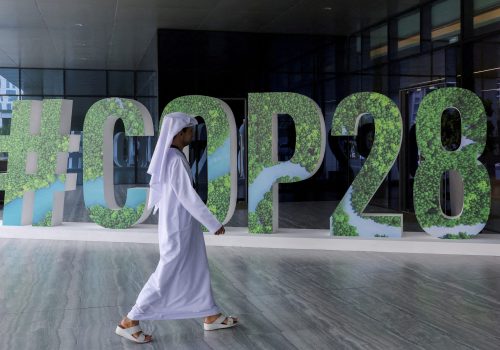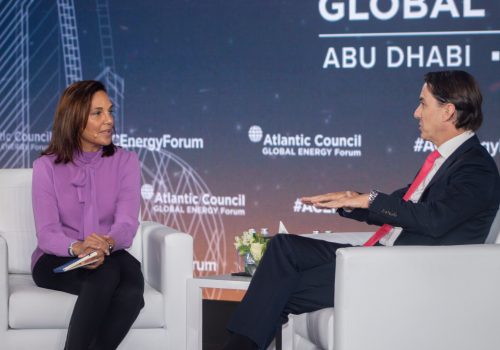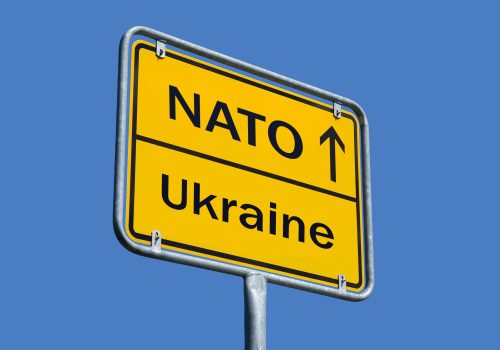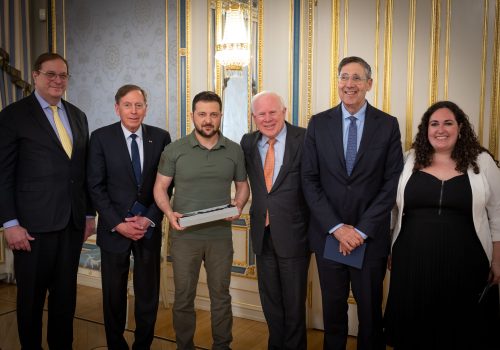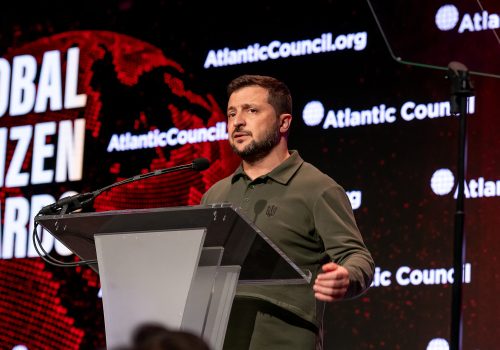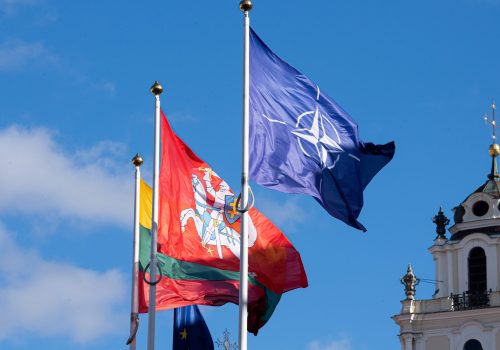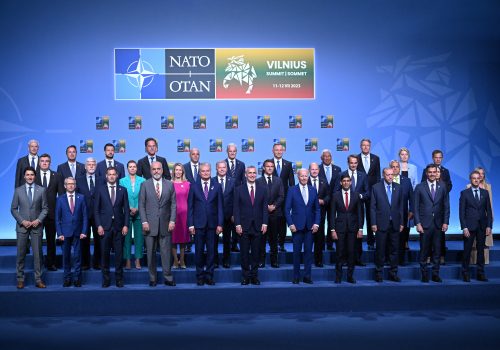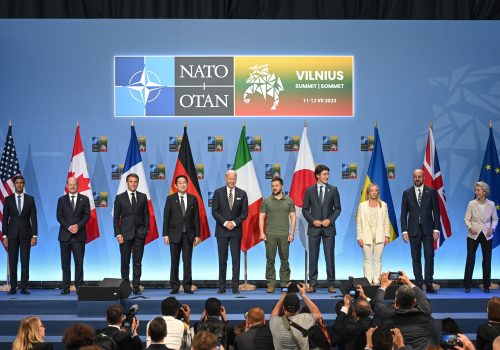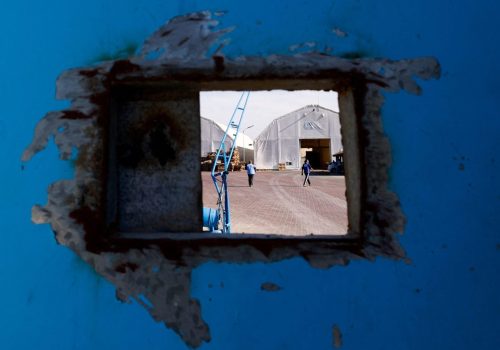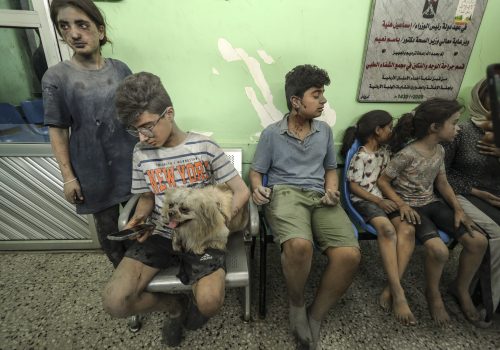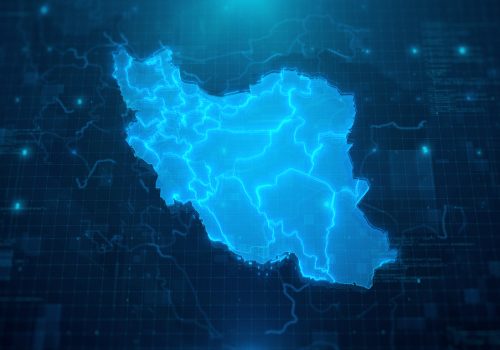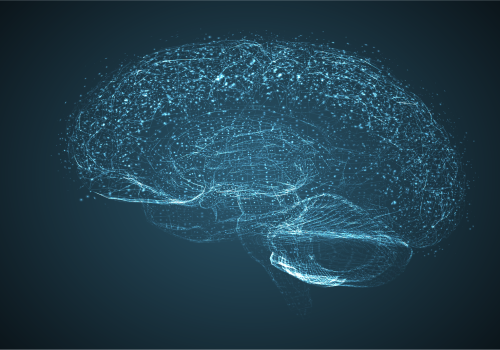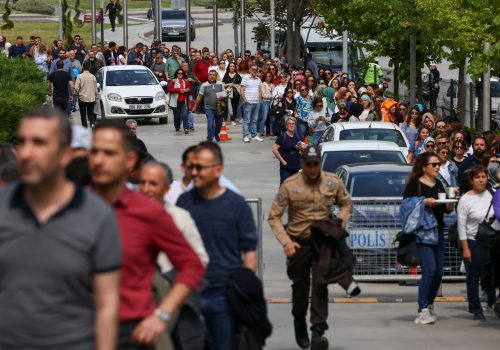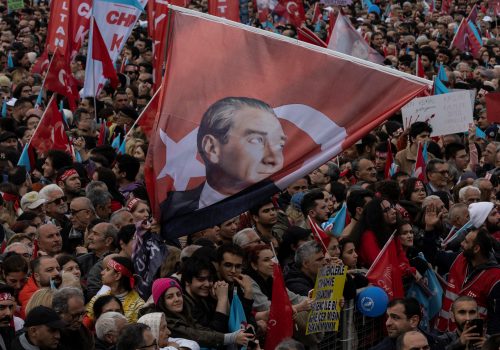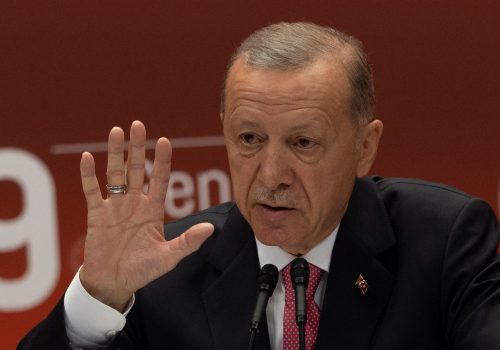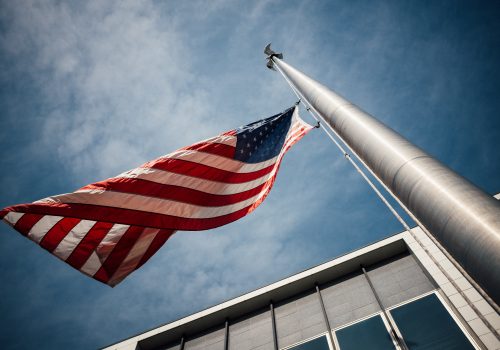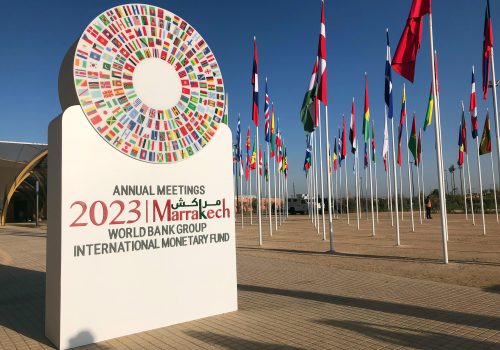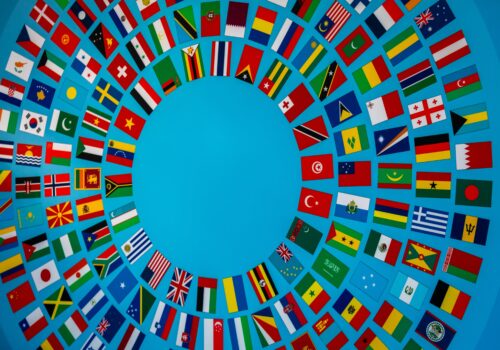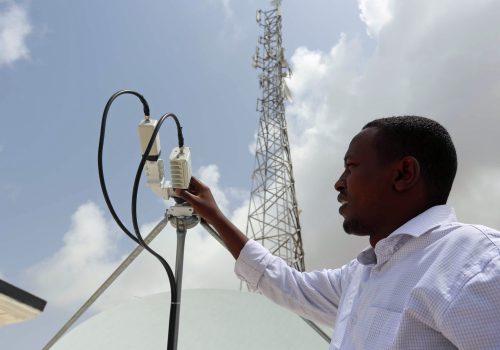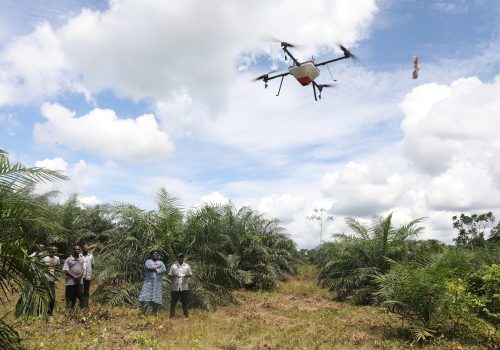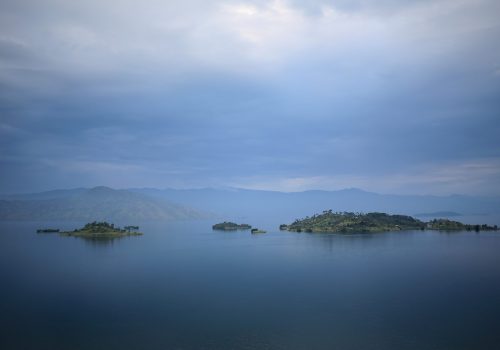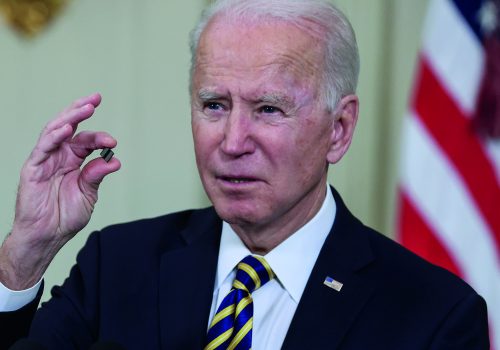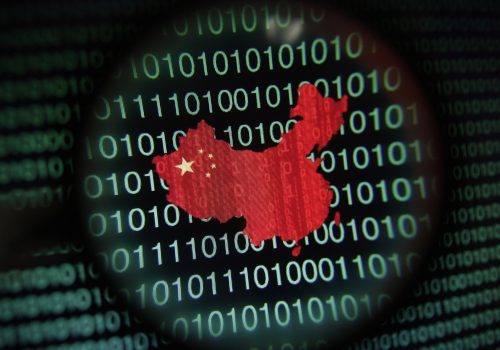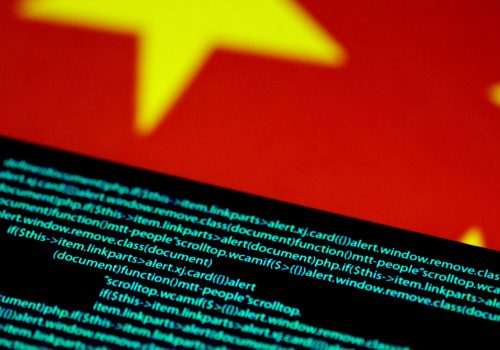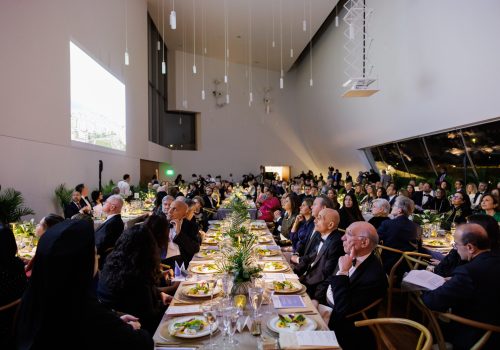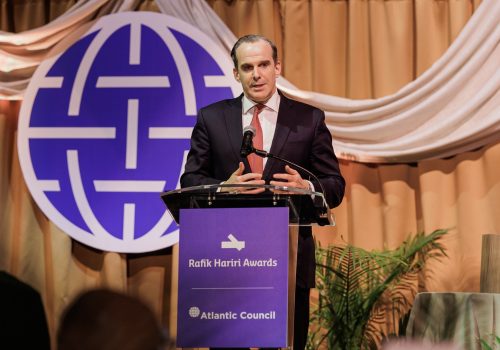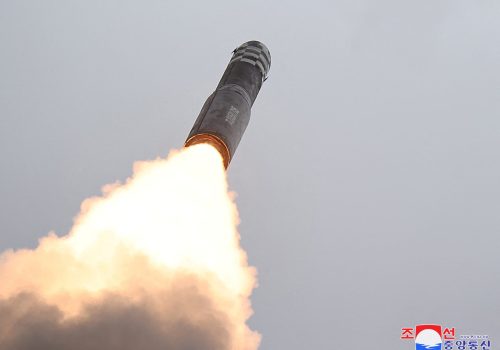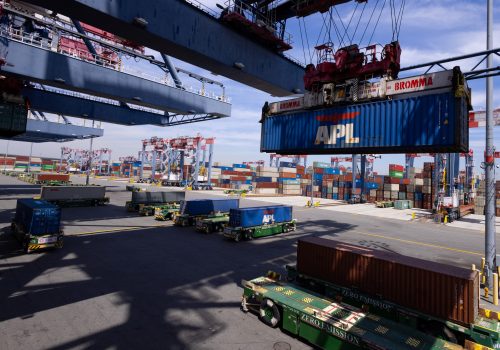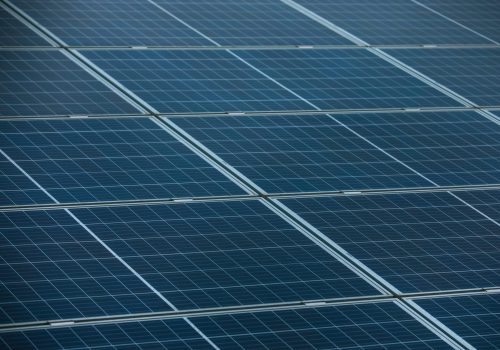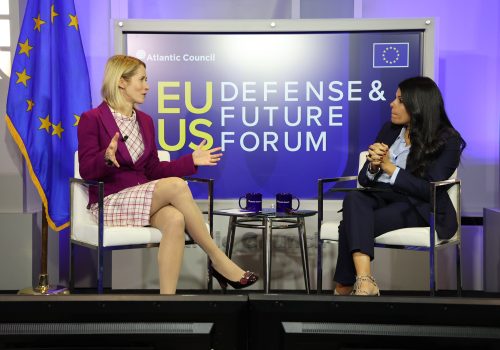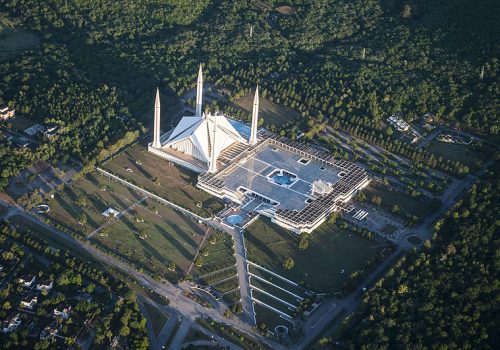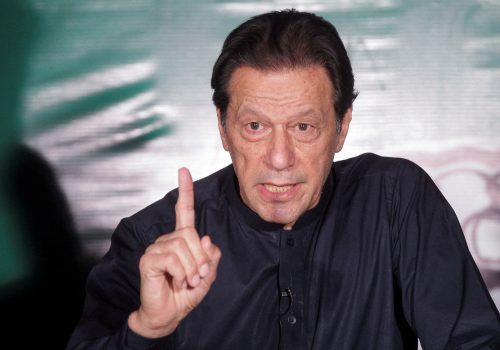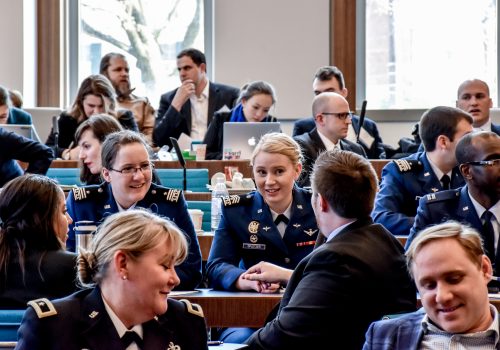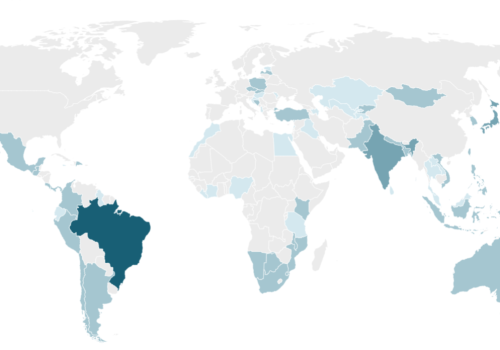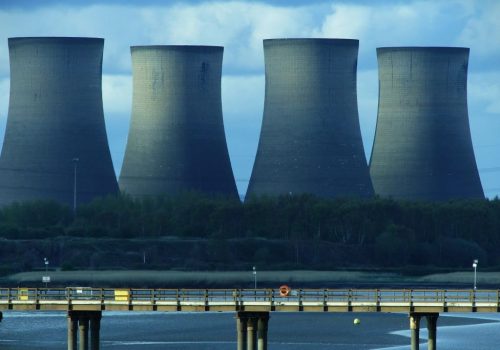In October, I urged US President Joe Biden to “connect the dots” on the threats to the global order posed by Russia’s revanchism, China’s antagonism, and Hamas’s brutality. It was a natural point to make because that’s what the talented team at the Atlantic Council does best. We connect the dots for policymakers on the most urgent global challenges of our age—and the list is long, from artificial intelligence to climate change to trade policy and beyond.
Our two dozen “greatest hits” of the year, which you’ll find below, encompass our best efforts to connect the dots and generate impact to further our mission of shaping the global future together with partners and allies. You’ll read about how we shaped the debate on the future of NATO, including Ukraine’s path to membership. We changed how leaders on both sides of the Atlantic think about sanctioning China in the event of a crisis over Taiwan. We were at the heart of the recently concluded United Nations climate change conference, known as COP28, where the energy industry joined together with governments to tackle the climate crisis in ways never before seen—oftentimes doing so during public and private Atlantic Council meetings. Throughout the year, we convened heads of state, civil society leaders, members of Congress, White House officials, and business leaders at high-level, high-profile events.
We are always looking ahead, but at the end of the year I find it inspiring to take stock of all that we’ve accomplished. I hope you will too, and that you’ll join us as we deliver even more impact during what promises to be a historic 2024.
Click to jump to a greatest hit:
Setting the NATO summit agenda
Mobilizing Atlantic Council-wide work on the Israel-Hamas war
Leading the future of a trustworthy internet
Shaping the debate on sanctioning China in a Taiwan crisis
Developing ‘The Freedom and Prosperity Equation’
Making sense of Turkey’s landmark elections
Informing data strategies for AI-powered government
Convening IMF-World Bank Week in Marrakesh
Rolling out the Climate Leadership Program
Shining the global spotlight on Africa’s needs
Serving as the place where Latin American and Caribbean leaders come to get things done
Hearing Brett McGurk outline the ‘Biden doctrine’ for the Middle East
Deterring a two-front war and nuclear attacks in East Asia
Setting the agenda for Pakistan
Investigating how extreme heat inflames gender inequalities in health and income
Building the next generation of global technology leaders
Hosting star-studded galas
Our Distinguished Leadership Awards in Washington and Global Citizen Awards in New York are always can’t-miss events—but that was true this year more than ever. Our all-female honoree slate of Distinguished Leadership Awardees included Commander of US Southern Command Gen. Laura Richardson, Nasdaq CEO Adena Friedman, World Trade Organization Director-General Ngozi Okonjo-Iweala, and National Intelligence Director Avril Haines. At the Global Citizen Awards, we honored Ukrainian President Volodymyr Zelenskyy, Japanese Prime Minister Fumio Kishida, German Chancellor Olaf Scholz, US Treasury Secretary Janet Yellen, and businessman Victor L.L. Chu. As one of our Global Citizen Awards attendees wrote to me afterwards, “For about two hours, it was the most influential room in the world.”
Delivering solutions at COP28
The Council delivered a record-breaking set of convenings at COP28 with over fifty staff from eight centers on the ground throughout the two-week period. The two-day Global Energy Forum, produced by our Global Energy Center (GEC), convened US climate envoy John Kerry, European climate commissioner Kadri Simson, and many more high-level speakers, and GEC put together dozens of panels and interviews at the Global Decarbonization Accelerator Connect space. For the third year in a row, the Adrienne Arsht-Rockefeller Foundation Resilience Center was a managing partner of the Resilience Hub and convened a steady stream of high-level guests including delegation lead, former US Secretary of State Hillary Clinton, and former President of Mexico Felipe Calderón, the center’s ambassadors for heat. And our Middle East Programs, Africa Center, Turkey program, Adrienne Arsht Latin America Center, and GeoTech Center staged events and contributed to our “live expertise” analysis and “Dispatches” newsletters throughout the conference.
Launching ACTV
In September, the Council joined the streaming scene with our new platform, ACTV, which gathers our events and original video series into one online home. Our new premium video offerings include “So What’s the Strategy?”, an interview series focused on breaking down US and allied strategy around the world, and “Smart in 60 Seconds,” a quick-hit explainer series delivering expert insight on the most urgent issues of the day.
Standing up for Ukraine
The Council’s Eurasia Center once again drove our work on Ukraine this year, highlighted by Atlantic Council CEO Fred Kempe, Chairman John F.W. Rogers, and Eurasia Center Senior Director John Herbst presenting the Global Citizen Award to Zelenskyy in Kyiv in May. Zelenskyy then joined the Global Citizen Awards gala in New York in September, where he delivered a powerful address dedicating his award to those on the front lines, Ukraine’s supporters abroad, and “to all our sweet children who have been killed by Russian terrorists.” The Eurasia team mobilized transatlantic support for Ukraine, engaging with lawmakers on Capitol Hill and leaders from around the world to work toward Russia’s defeat in Ukraine. We also laid the groundwork for a more productive NATO summit in Washington in 2024, with a new “Memo to the President” detailing how to further integrate Ukraine into the Alliance in a manner that strengthens Ukraine’s position on the battlefield.
Setting the NATO summit agenda
In July, NATO heads of state and government faced down Vladimir Putin during a gathering in Vilnius, just twenty miles from the border of Belarus—and we were right there with them, convening leading experts, senior NATO and allied officials, and industry representatives to take stock of the most pressing security challenges and provide expert perspectives on decisions reached at the summit. The Scowcroft Center for Strategy and Security’s Transatlantic Security Initiative drove the Atlantic Council’s engagement in the lead-up to the Vilnius Summit with in-depth research and analysis on key challenges facing the Alliance. On the ground in Vilnius, we co-hosted the NATO Public Forum, reacted to breaking news, and convened private conversations with senior experts and decision makers to reflect on the communiqué and chart the path forward for NATO’s continued transformation.
Mobilizing Atlantic Council-wide work on the Israel-Hamas war
From fast thinking on the ground in Israel in the hours after Hamas’s brutal terrorist attack of October 7 to ongoing deep thinking about the consequences of the ensuing conflict for the future of the Middle East to day-after planning for Gaza, teams across the Atlantic Council have responded with speed and smarts to the events that have gripped the region in recent months. In a rapidly changing conflict that has inflamed tensions around the world, we have informed policymakers and the public by bringing light, not heat, to the debate. That included hosting Israeli President Isaac Herzog and Egyptian Foreign Minister Sameh Shoukry for high-level AC Front Page events.
Leading the future of a trustworthy internet
Amid a seemingly Cambrian explosion of technological advancement including the introduction and widespread adoption of ChatGPT, the Digital Forensic Research Lab’s Democracy and Tech Initiative assembled a diverse array of forty experts for a five-month sprint to understand the state of trust and safety in our day-to-day digital lives and define an action-oriented agenda to make the internet safer and more trustworthy. In June, they launched their report, “Scaling Trust on the Web,” which delivered major impact across an array of fields. Major tech companies—including leading artificial intelligence (AI) startups—made the report required reading for their Trust and Safety teams, governments incorporated recommendations into their new AI rules and policies, and foundations increased investments in the ecosystem highlighted by the report.
Shaping the debate on sanctioning China in a Taiwan crisis
This year, the GeoEconomics Center and Rhodium Group took on one of the biggest questions facing the West: What are the costs of using the tools of economic statecraft if China undertakes a major escalation in Taiwan? The report was the product of eight months of research, including on-the-ground private workshops with policymakers and financial institutions in Brussels, London, and Berlin. The findings—including the estimated three trillion dollars in immediate costs to the global economy if banking sanctions were imposed—were featured in standalone write-ups in the Economist and the Wall Street Journal. The report has become a hot topic of debate, with the team doing briefings across Congress, the Biden administration, and Group of Seven (G7) governments. Even China has reportedly taken note. As one senior official told us, the report itself showed how serious the thinking was on this topic—and generated new transatlantic coordination on the challenge.
Developing ‘The Freedom and Prosperity Equation’
The authoritarian development model doesn’t work. This collection of essays by thirty scholars and political leaders from twelve countries makes the case that the surest way for developing countries to meet the aspirations of their people is by enhancing economic, political, and legal freedom. The book was co-edited by the Freedom and Prosperity Center’s senior director together with the chief executive officers of Atlas Network and Acton Institute, two organizations dedicated to free people and free economies in the Global South.
Making sense of Turkey’s landmark elections
In May, Turkey, an important but at times challenging NATO ally, went to the polls to choose the next president and parliament—in what was dubbed the most important election of the year. The Atlantic Council’s Turkey program emerged as a thought leader in providing commentary and analysis on the elections, which were ultimately won by incumbent Recep Tayyip Erdogan and the ruling alliance. Afterward, the team organized two public events to break down the vote and evaluate the international and foreign policy implications.
Informing data strategies for AI-powered government
The GeoTech Center hosted a three-part event series exploring data strategies for an AI-powered government. The series of events convened leaders from the federal chief information officer, chief data officer, mission data, defense, and intelligence communities to discuss the challenges and opportunities in making data “AI-ready” across the federal enterprise. As a result of these discussions, the GeoTech Center released key findings and recommendations that were presented at an event in October, where experts shared what agencies are doing to successfully plan and develop data-centric AI applications.
Convening IMF-World Bank Week in Marrakesh
If you attended the International Monetary Fund-World Bank meetings in Morocco this year, you couldn’t miss the Atlantic Council. We were in person with a sunlit studio setup that hosted finance ministers and other policymakers all week for exclusive interviews, and in inboxes with our innovative daily “Dispatches” newsletters providing insightful quick-hit analysis led by our experts from our GeoEconomics Center, alongside the Africa Center and Middle East Programs.
Rolling out the Climate Leadership Program
This year the Millennium Leadership Program, building on its transformative leadership initiatives, launched the Climate Leadership Program, a dynamic community accelerator for climate investors across the United States, China, the European Union (EU), and the African Union. The inaugural program focused on convening and connecting the next generation of climate venture capitalists driving critical technological innovation to mitigate climate risk and adapt to new realities. Following immersive virtual sessions, participants convened in Accra, Ghana to meet with climate entrepreneurs, develop strategies for advancing the global climate-investment ecosystem, and create action plans to increase inclusivity in climate finance.
Shining the global spotlight on Africa’s needs
Africa’s time has come, and the Africa Center is relentlessly focused on making sure the world knows it. That has included traveling to Botswana to discuss the upcoming expiration of the African Growth and Opportunity Act, hosting conversations on Bretton Woods reforms at the IMF-World Bank meetings in Morocco, and attending COP28 in the United Arab Emirates. The center spent 2023 focused on pushing for more public and private sector investment in Africa, with a focus on innovative and creative industries, and encouraging US policymakers to move beyond just humanitarian assistance to a more robust approach to economic development, green energy, and industrial transformation. These efforts culminated in major reports on critical connectivity in Africa, the role of technology in agriculture (agritech), and green banking with an Africa focus.
Decoding China’s tech efforts
The Global China Hub partnered with centers and programs across the Atlantic Council, such as the GeoEconomics Center and Scowcroft Center for Strategy and Security, to lead the conversation on China’s drive to dominate emerging technologies in the context of growing US-China strategic competition. This robust body of work included reports and convenings examining China’s approach in individual sectors—including 5G/6G, artificial intelligence, semiconductors, and software—and its overarching technology strategy, including in the Global South. Senior US and allied officials’ participation in convenings and regular briefings of research findings amplified the impact of this programming. Across all of these efforts, we looked at how the United States can partner with allies to navigate the challenges posed by China’s technology ambitions and export of its techno-authoritarian practices around the world.
Serving as the place where Latin American and Caribbean leaders come to get things done
Two events this year in coordination with the White House underlined the Adrienne Arsht Latin America Center’s position as a pivotal player in international dialogues and policy impact. In June, with just three weeks’ notice, we organized the PACC 2030 Climate Resilient Clean Energy Summit, aligned with US Vice President Kamala Harris’s visit to the Bahamas. Then, in November, we hosted the official welcome dinner of the Inaugural Leaders’ Summit of the Americas Partnership for Economic Prosperity, at Adrienne Arsht’s residence in Washington. Six presidents from the region joined the dinner, along with many other dignitaries, proving once again the center’s strategic capability in advancing meaningful international relationships and dialogues.
Hearing Brett McGurk outline the ‘Biden doctrine’ for the Middle East
On February 14, the Rafik Hariri Center for the Middle East hosted the inaugural Rafik Hariri Awards, celebrating the center’s tenth anniversary, at the John F. Kennedy Center for the Performing Arts. Among the award recipients were Sir Magdi Yacoub, founder of the Magdi Yacoub Global Heart Foundation, Magdi Yacoub Foundation, and Chain of Hope; Fatma Said, an award-winning soprano; Ahmad Abu Ghazaleh, executive vice chairman of Abdali Hospital; and the late Dame Zaha Hadid, an international award-winning architect. White House Coordinator for the Middle East and North Africa Brett McGurk delivered a keynote address in which he outlined the key principles guiding the Biden administration’s approach to the region.
Deterring a two-front war and nuclear attacks in East Asia
In its inaugural year, the Indo-Pacific Security Initiative published the Atlantic Council’s most-read long-form report of 2023: a deep dive into the prospect of a two-front war in East Asia. The report explores how and why there is a high risk that a conflict with China or North Korea could escalate across the region into simultaneous conflicts with both countries and/or escalate in intensity to nuclear strikes. With actionable recommendations for policymakers and military leaders, it calls for a paradigm shift in how the United States and its allies think about deterrence in the Indo-Pacific, particularly to overcome the biases and questionable assumptions that have led the United States and its allies to artificially consider these two threats separately. This groundbreaking analysis has already garnered a great deal of attention and interest in the United States and abroad, including through its rollout in a public panel at the US Strategic Command’s annual deterrence symposium, two widely distributed Atlantic Council TV videos, and citations by numerous US and regional media outlets.
Owning US-EU cooperation
Throughout 2023, the Europe Center led the charge on all things US-EU cooperation—combining forward-leaning reports and policy papers on the issues impacting Europe with our convening power to provide a transatlantic perspective on policy debates. The center’s Next Europe workstream developed a transatlantic industrial policy agenda and convened a series of policy debates on transatlantic convergence on China. The TTC Track Two Dialogues produced definitive reports on the future of the US-EU Trade and Technology Council, the Transform Europe Initiative wrote policy memos and reports on Europe’s strategic decarbonization, and the Balkans Forward Initiative raised the ambition on the enlargement of the EU and integration of the Western Balkans along with Ukraine and Moldova. These efforts were multiplied by hundreds of public and private convenings across Europe and the United States to promote transatlantic ties, culminating in the third annual EU-US Defense & Future Forum, which made the case for the US-EU relationship in today’s geopolitical age.
Setting the agenda for Pakistan
In November, the South Asia Center held its second annual Pakistan Conference, focused on resilience and reforms heading into an election year in 2024. Discussions included the future of AI, the role of middle powers in today’s volatile geopolitical environment, and ways in which Pakistan’s economy can be reformed so that it generates opportunities for the many, not just for the few. Coupled with newsmaking interviews with Indian Finance Minister Nirmala Sitharaman and former Pakistani Prime Minister Imran Khan, the South Asia Center further established itself as Washington’s go-to source on the region.
Investigating how extreme heat inflames gender inequalities in health and income
In July, the Adrienne Arsht-Rockefeller Foundation Resilience Center released a groundbreaking report examining the profound and unequal impact of heat on women’s unpaid domestic labor, paid employment, and health in India, Nigeria, and the United States—examining current and projected 2050 conditions. Drawing on original research on socioeconomic variables such as population, employment, health, and economic activity, and deploying best-in-class climate models, the report illuminates the deep disadvantages that women and girls face in a hotter world. Beyond the numbers, the report shares the firsthand experiences of women across these three countries to unveil the very human cost of extreme heat—paving the way for gender-informed interventions, investments, policies, and research.
Building the next generation of global technology leaders
Throughout the year, the Atlantic Council continued to build and lead global communities around how technology impacts everything from our daily lives to global competition. The Cyber Statecraft Initiative’s Cyber 9/12 Competition expanded to include 706 students this year in ten competitions from the United States to Uzbekistan. The Digital Forensic Research Lab’s Digital Sherlocks program remains the largest free course for ethical research on the open internet, with 1,129 participants from 107 countries this year. Meanwhile, the GeoTech Center’s AI Connect program built a network across sixty-five countries to support emerging leaders in low- and middle-income countries in designing and deploying trustworthy AI through responsible, internationally accepted principles of free and open governance.
Breaking ground on nuclear energy policy
The Nuclear Energy Policy Initiative hosted its inaugural Nuclear Energy Policy Summit in New York in September. The Summit took place on the sidelines of New York Climate Week, and it situated nuclear energy at the center of discussions on climate and finance, drawing more than one hundred in person guests and thousands of online views. Special Presidential Envoy for Climate John Kerry delivered keynote remarks.
Forecasting the future through Global Foresight 2023
Our innovative Global Foresight franchise—which seeks to equip policymakers and the public in the present with the insight and foresight that come from conjuring possible futures—added a new dimension this past year: A survey of leading experts on what the world could look like in ten years. The results, which were featured exclusively by the Financial Times, made headlines around the world, while our list of top risks and opportunities in 2023 and “snow leopards” scored exclusives in the Washington Post and New York Times, respectively. Stay tuned in the coming weeks for more big findings from our 2024 edition.
